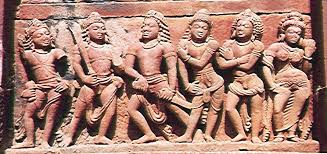महाभरत
Mahābharata
As retold by
Michael Dolan, B.V. Mahāyogi
This is the beginning of a retelling of Mahabharata that I'm working on. We start at the end of the battle of Kurukshetra, contemplating the horrors of war and then begin discussing the origins of the war.
कुरुक्षेत्र
Prologue: Kurukshetra
It was the
end of the world. Slaughtered bodies lay everywhere.

Hundreds and thousands of warriors killed. Golden chariots overthrown and wrecked, their axles broken. Carcasses of horses. Thousands of dead elephants. The burned earth littered with arrows and dying men, pierced by javelins and darts, screaming in pain.

The women moaned, weeping for the dead. Bronze and iron swords mixed in dust with spears and blood, crushed soldiers underneath. Beheaded men, their necks gushing blood. Bodies everywhere. The horror of war. The end of an age.
Hundreds and thousands of warriors killed. Golden chariots overthrown and wrecked, their axles broken. Carcasses of horses. Thousands of dead elephants. The burned earth littered with arrows and dying men, pierced by javelins and darts, screaming in pain.
The women moaned, weeping for the dead. Bronze and iron swords mixed in dust with spears and blood, crushed soldiers underneath. Beheaded men, their necks gushing blood. Bodies everywhere. The horror of war. The end of an age.
Since the dawn of time, great civilizations have flourished, decayed and
vanished. The
awesome carnage of the Kurukṣetra war ended the third age of the Vedic
Civilization, ushering in the darkness of the age of Kali the age of iron and corruption.
Our panorama of the battlefield shows absolute devastation. Vultures pick the bones of half-dead horses as smoke curls into the morning sky. What were once green,
rolling plains are pantheons for the bones of warriors in a mass of charred devastation. Where champions rode in battle with colorful flags, now only scorched earth and corpses remain.

Now are only burned out craters where once fiery weapons took the lives of great heroes.

Smoke rises from the funeral pyres of dead warriors. Widows wail and chant songs of grief, searching for survivors amid the wreckage of broken shields and bones. Passing their fallen heroes, they decorate the dead with flowers and pray to the gods.

Glorious and proud banners and are strewn and scattered in the mud along with their heroes, their broken shields and bodies.

Now are only burned out craters where once fiery weapons took the lives of great heroes.
Smoke rises from the funeral pyres of dead warriors. Widows wail and chant songs of grief, searching for survivors amid the wreckage of broken shields and bones. Passing their fallen heroes, they decorate the dead with flowers and pray to the gods.
Glorious and proud banners and are strewn and scattered in the mud along with their heroes, their broken shields and bodies.
The sun falls and rises again. Another day comes. Kurukshetra. The battle is finished. Our scene is set.
AŚVATTHĀMĀ’S REVENGE
And on the following day as the sun rose blood red over the plains of that devastated battlefield where so many had lost their lives, the Paṇḍava princes walked among the cadavers of slain heroes and once proud and arrogant princes. Wounded horses whined. The cough of dying men could be heard echoing over the plaintive songs of larks and wrens. Women mourned their dead. The standards of great heros were fallen in the mud. The funeral pyres of the dead dotted the landscape.
The Paṇḍavas walked wearily across
the battle plains to the Ganges, preceded by the women. They were mourning the
dead. The women took the holy water from the river in waterpots and carried it
to the fallen soldiers, sprinkling it over their remains. Crows perched on
elephants. Vultures circled overhead. Draupadī bowed her head in tears.


Aśvatthāmā had attacked in rage.
Determined that his father’s death would not go in vain, he sold his soul to
Shiva in revenge. The accursed Aśvatthāmā
rode at night to the camp of the Paṇḍavas. He stole into the camp
unseen, as no moon shone, and left his horse tied by a tree.
And as stealthily as a
tiger in the low grass, the son of Droṇa crept forward to the quarters of
Dhristhtadyumna. The Panchalas were sleeping after so long a fight, weary with
war. And so, entering into the chamber of Draupadī’s fiery brother, the cruel
Aśvatthāmā crept closer. The great hero lay sleeping on a fine feather bed,
covered in silk sheets, white as clouds. Garlands of fragrant flowers adorned
his bed. His room was perfumed with fine sandalwood incense creating a fine
misty smoke.

No comments:
Post a Comment
Note: Only a member of this blog may post a comment.